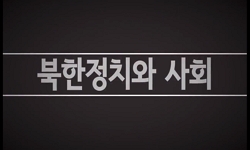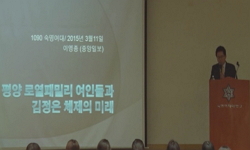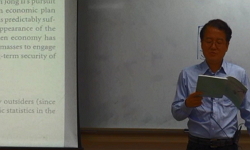본 연구는 갑오농민전쟁에 대한 북한 역사학계의 연구에서 보이는 동학의 영향에 대한 인식을 확인하는 것을 목적으로 한다. 갑오농민전쟁은 남북한 모두에게 큰 역사적 의의가 있는 사건...
http://chineseinput.net/에서 pinyin(병음)방식으로 중국어를 변환할 수 있습니다.
변환된 중국어를 복사하여 사용하시면 됩니다.
- 中文 을 입력하시려면 zhongwen을 입력하시고 space를누르시면됩니다.
- 北京 을 입력하시려면 beijing을 입력하시고 space를 누르시면 됩니다.
북한의 갑오농민전쟁사 연구 -동학의 영향에 대한 인식을 중심으로- = A Study on the History of the Gabo Farmers War in North Korea: Focusing on the perception of the influence of Donghak
한글로보기https://www.riss.kr/link?id=T15918855
- 저자
-
발행사항
창원 : 북한대학원대학교, 2021
- 학위논문사항
-
발행연도
2021
-
작성언어
한국어
-
주제어
북한 ; 북한의 역사학 ; 갑오농민전쟁 ; 동학농민운동 ; 동학 ; 천도교 ; North Korea ; North Korea's history ; Gabo Peasant War ; Donghak Peasant Movement ; Donghak ; Cheondogyo
-
발행국(도시)
경상남도
-
형태사항
114 ; 26 cm
-
일반주기명
지도교수: 김성경
-
UCI식별코드
I804:48002-200000501826
- 소장기관
-
0
상세조회 -
0
다운로드
부가정보
국문 초록 (Abstract)
본 연구는 갑오농민전쟁에 대한 북한 역사학계의 연구에서 보이는 동학의 영향에 대한 인식을 확인하는 것을 목적으로 한다. 갑오농민전쟁은 남북한 모두에게 큰 역사적 의의가 있는 사건으로 ‘농민대중이 동학 조직을 이용하여 일으킨 반침략, 반봉건적 성격의 농민전쟁’이라는 공통된 역사적 평가가 이루어져 왔다.
본 연구는 북한의 갑오농민전쟁 관련 문헌을 시기별로 분석하는 방법으로 실시되었다. 시기는 해방 이후부터 한국전쟁 이전까지, 휴전 이후부터 주체사관 형성 이전까지, 주체사관 시기부터 ‘조선민족제일주의’ 정신의 등장 이전까지, 조선민족제일주의 시기부터 현재까지 총 네 시기로 구분하여 북한 역사학의 간략한 전개 과정과 갑오농민전쟁사 연구 경향, 동학의 영향에 대한 인식을 살펴보았다.
북한의 역사학은 해방 이후부터 한국전쟁의 발발 전까지는 소련의 영향을 받으며 식민사관 극복을 위한 민족주의적 연구와 함께 맑스-레닌주의에 입각한 유물사관적 연구가 시도되었다. 휴전 이후부터 주체사관 성립 이전 시기까지는 김일성 중심의 유일 지도체제 구축과 함께 기존의 사관이 ‘주체’적으로 변용되며 시대구분과 같은 문제가 활발하게 논의되었다. 수령제 확립 이후에는 주체사관이 형성되면서 주체사관이 유일한 역사관으로 작동되기 시작했고 1980년대에 대내외적 위기 고조로 ‘조선민족제일주의’ 정신이 강조되면서는 ‘우리식 사회주의’의 강조와 함께 민족적 요소의 우수성 강조 등이 이루어지기도 했다. 이러한 북한 역사학의 전개 과정에서도 갑오농민전쟁은 그 뚜렷한 역사적 성격 때문에 학계의 연구 경향이 크게 변하지는 않았다.
갑오농민전쟁사 자체에 대한 북한 학계의 인식변화는 없었지만, 동학의 영향에 대한 인식은 시기별로 미묘한 차이를 보였다. 해방 이후 초기 연구에서는 동학의 조직적 영향만을 인정하는 ‘종교 외피론’적 인식으로 농민대중의 투쟁이라는 사건의 본질적 성격을 강조하였다. 이후로도 동학의 조직적 영향에 대해서는 분산된 농민운동을 하나로 묶어 대규모 농민전쟁을 가능하게 했다는 인식이 현재까지 변함없이 이어지고 있다. 동학의 종교적 영향에 대해서는 그 미신적 성격으로 농민대중에 깊숙이 침투했지만, 종교적 한계성 때문에 농민전쟁을 더욱 혁명적 차원으로 이끌지 못했다는 지적이 이어지다가 조선민족제일주의 시기에 들어서 ‘민족종교’로서의 평가와 함께 부정적 인식이 축소되는 경향을 보였다. 동학의 영향 중 사상적 측면의 영향은 그 인식의 변화 폭이 비교적 크다. 초기의 연구에서는 진부한 사상으로 새로운 것 없는 유학의 아류로 치부하며 그 영향을 축소했지만, 휴전 이후 연구부터 점차 동학사상의 반침략, 반봉건적 성격을 평가하며 주체사관 시기에 정립되는 경향을 보였고 조선민족제일주의 시기에는 ‘애국애족’적 성격이 강조되기도 했다.
다국어 초록 (Multilingual Abstract)
The purpose of this study is to identify the perception of the influence of Donghak in the study of North Korean historians on the Gabo Peasant War. The Gabo Peasant War is a significant historical event for both the two Koreas, and has been evaluated...
The purpose of this study is to identify the perception of the influence of Donghak in the study of North Korean historians on the Gabo Peasant War. The Gabo Peasant War is a significant historical event for both the two Koreas, and has been evaluated as a ‘anti-invasion, anti-feudal peasant war caused by the peasant public using the Donghak organization.’
This study was conducted by analyzing the literature related to the Gabo Peasant War in North Korea and examined by time. From the liberation to the Korean War, from the armistice to the formation of the Juche view of history, from the formation of the Juche view of history to the emergence of the ‘Korean National Firstism’ spirit, from the period of ‘Korean National Firstism’ to the present, The four periods were divided into four periods to examine the brief development of North Korean history, the trend of research on the history of the Gabo Peasant War, and the perception of the influence of Donghak.
North Korea's history was influenced by the Soviet Union from liberation to the outbreak of the Korean War along with nationalist studies to overcome colonial historical views, historical studies based on Marxism and Leninism were attempted. From the armistice to the period before the establishment of the Juche Historical View, along with the establishment of a unique leadership system centered on Kim Il-sung, existing history was transformed into a ‘Juche’ and issues such as the division of the times were actively discussed. After the establishment of the dictatorship, the Juche view of history began to work as the only view of history, in the 1980s, the spirit of ‘Korean National Firstism’ was emphasized due to the heightened internal and external crises, and the emphasis on the excellence of ethnic elements was made along with the emphasis on ‘our style socialism.’ Even in the course of this development of North Korean history, the Gabo Peasant War did not change much in academic research due to its distinct historical nature.
There has been no change in North Korean academic perception of the history of the Gabo Peasant War itself, the perception of the influence of Donghak differed from time to time. Early research after liberation emphasized the essential nature of the struggle of the peasant public with the ‘religious cladding’ perception that only recognized the organizational influence of Donghak. Since then, the perception of organizational influence that the distributed peasant movement has been united to enable a large-scale peasant war has remained unchanged, and that religious influence of Donghak has not led the peasant war to a more revolutionary level due to religious limitations, during the period of ‘Korean National Firstism’ negative perceptions tended to be reduced along with evaluation as a ‘national religion.’ The ideological impact of the influence of the Donghak is relatively large in its perception. Early studies reduced the impact by dismissing it as a cliche of study abroad, but after the armistice, the study gradually assessed the anti-invasion and anti-feudal nature of Donghak ideology and tended to be established during the period of Juche Historical View, during the period of ‘Korean National Firstism,’ the ‘patriotic’ character was emphasized.
목차 (Table of Contents)
- 국문요약 = ⅳ
- 제1장 서론 = 1
- 제1절 연구의 목적 = 1
- 제2절 선행연구 검토 = 4
- 1. 동학의 영향에 대한 남한 역사학계의 인식 = 4
- 국문요약 = ⅳ
- 제1장 서론 = 1
- 제1절 연구의 목적 = 1
- 제2절 선행연구 검토 = 4
- 1. 동학의 영향에 대한 남한 역사학계의 인식 = 4
- 2. 북한의 갑오농민전쟁사 연구에 관한 남한의 연구 = 8
- 제3절 연구대상 및 연구 방법 = 11
- 제2장 주체사관 형성 이전의 갑오농민전쟁사 연구 = 13
- 제1절 해방 이후부터 한국전쟁 이전까지의 연구 = 13
- 1. 초기 북한 역사학계의 연구 경향과 갑오농민전쟁사 인식 = 13
- 2. 리청원의 연구와 동학의 ‘종교 외피론’적 인식 = 17
- 3. 전석담의 사회경제사적 갑오농민전쟁사 연구 = 24
- 제2절 휴전 이후부터 주체사관 형성 이전까지의 연구 = 33
- 1. 휴전 이후 동학의 영향에 대한 북한 역사학계의 인식 = 33
- 2. 지나친 동학의 영향 인식에 대한 오길보의 반론 = 40
- 3. 오길보의 반론 제기로 인한 북한 역사학계의 토론 = 43
- 제3장 주체사관 형성 이후의 갑오농민전쟁사 연구 = 51
- 제1절 주체사관 시기의 갑오농민전쟁사 연구 = 51
- 1. 주체사관의 형성과 <조선전사>의 편찬 = 51
- 2. <조선전사>에서의 갑오농민전쟁사 서술 = 54
- 3. <조선전사>이외 문헌에서의 동학의 영향 인식 = 62
- 제2절 조선민족제일주의 시기의 갑오농민전쟁사 연구 = 68
- 1. ‘조선민족제일주의’ 정신의 등장 = 68
- 2. 갑오농민전쟁과 동학사상에 대한 애국애족적 성격 강조 = 71
- 3. 동학, 천도교에 대한 상향 평가의 증가 = 87
- 제4장 결론 = 101
- 참고문헌 = 104
- ABSTRACT = 112












